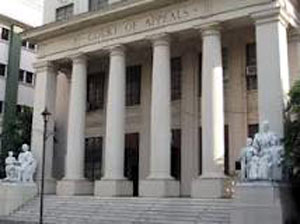
File photo
MANILA, Philippines–The Court of Appeals has dismissed an appeal by a former official of the Bangko Sentral ng Pilipinas not to have him extradited to Hong Kong to face a criminal suit filed there against him.
In a 7-page amended decision issued on Friday, the court’s sixth division through Associate Justice Hakim Abdulwahid said that it found probable cause for the extradition of Juan Antonio Muñoz based on the documents submitted by the Hong Kong government.
Muñoz, former head of the BSP’s Treasury Department, is facing a criminal suit in Hong Kong for allegedly receiving illegal payments while doing business with Moccatta Hong Kong, a subsidiary of the Standard Chartered Bank, in behalf of the BSP, then known as Central Bank of the Philippines. The suit, filed in 1994, sought the extradition of Muñoz.
Muñoz, who had gone back to the Philippines, went to a Manila court and asked it to deny the extradition request, arguing that the RP-HK Extradition Treaty no longer exists after Hong Kong became a special administrative region of China on July 1, 1997.
He further argued that his extradition would mean the Philippines would turn him to a third State-China which is not part of the RP-HK agreement.
In 2006, the Manila court ruled for Muñoz’ extradition, saying the documents submitted by the Hong Kong government were in compliance with the requirements of the RP-Hong Kong Extradition Treaty.
The lower court added that it had no jurisdiction on Muñoz’ defenses because its authority was limited to determining whether the extradition request complied with the extradition treaty and whether the person sought was extraditable.
Muñoz filed an appeal before the Court of Appeals, citing the same arguments. In 2012, the appeals court upheld the lower court’s ruling, explaining that even if Hong Kong had become part of China, it is “still empowered to enter into international agreements including extradition treaties in its own name.”
“It is thus misplaced for (Muñoz) to claim interruption in the affectivity of the treaty and expect further state action from either Hong Kong or China beyond the explicit pronouncements,” the appeals court said.
“Clearly, it would be most unfair to prevent (Hong Kong) from resorting to the extradition of (Muñoz) on the imagined lack of reciprocity,’’ the appeals court added.
Muñoz again filed an appeal. And again, the Court of Appeals dismissed Muñoz bid against extradition to Hong Kong in a decision promulgated on March 1, 2013, but released only on Friday.
The appeals court, however, granted the dropping of the charge of accepting an advantage as an agent on the extradition request for non-compliance with the double criminality rule. Double criminality rule means that the criminal charge the accused is facing at the requesting country (Hong Kong) has to have an equivalent offense in the second country, in this case Philippines.
The court said that the extradition will still push through because Muñoz is still facing a case for conspiracy to defraud which is equivalent to swindling (estafa) and violation of Republic Act 3019 or the Anti-Graft Law in the Philippines.
The case of Muñoz prompted the BSP to improve its internal controls and its reporting and monitoring systems to prevent direct dealings as those done by Muñoz.